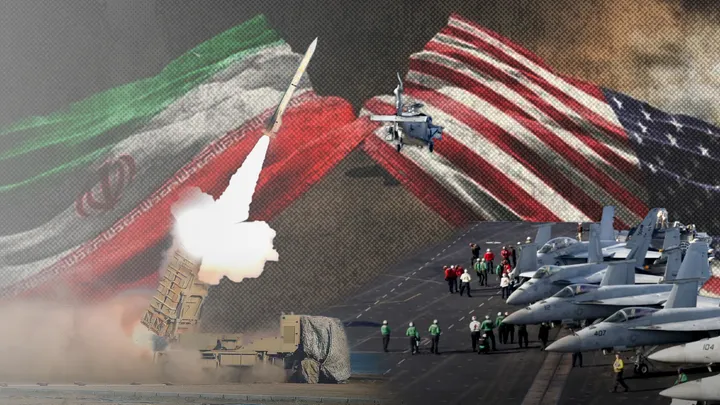Six months after the Sochi meeting, the presidents of Russia, Iran and Turkey once again came together in Ankara on Monday to address the Syrian conflict and its far-reaching consequences.
The issues on the table range from the status of northeastern Syria to the formation of the constitutional committee.
Since 2017, the Astana trio have succeeded in establishing a peace process parallel to the UN-led Geneva talks. Prior to the ongoing contact, they have held six trilateral meetings.
Washington’s inaction against the Assad regime and support of the YPG against the wishes of its NATO ally Turkey became one of the main grounds for Ankara to begin engagement with Moscow and Tehran.
The YPG is the Syrian wing of the PKK, which has been recognised as a terrorist organisation by the US, EU and Turkey.
Although Tehran and Moscow are the backers and enablers of the Assad regime, Ankara still engaged with them in pursuit of finding lasting peace in Syria and also to address the security threat emanating from the presence of the YPG alongside Turkey's southeastern border.
The trio appears to have reached a political consensus on the future of northeastern Syria, which has been held by the YPG-dominated SDF since 2012, exploiting the security vacuum left by years of civil war.
“The situation in the northeast of Syria — is worrisome. Here, like everywhere else, every matter should be settled based on principles of sovereignty and territorial integrity. We are coming to the belief that it is unacceptable to divide Syria into spheres of influence,” said Russian President Vladimir Putin during the meeting, criticising the US military presence in the region and its support to the YPG.
The US has used the YPG to create a sphere of influence in the region, even though it also meant creating a security threat for its own ally Turkey. The YPG’s umbrella organisation PKK has waged a three-decade-long terror campaign against the Turkish state, leading to tens of thousands of deaths.
"The PKK, and its extension the YPG/PYD, is the biggest threat to Syria's future. As long as the PKK/PYD presence in the country continues, neither Syria nor our region can find peace," Turkish President Recep Tayyip Erdogan said.
Iranian President Hassan Rouhani agreed with Erdogan.
"The presence of American military forces in a United Nations member and independent country such as Syria endangers its territorial integrity and national sovereignty," Rouhani said at the summit.
"American forces should leave the country at once," Rouhani declared.
Turkey has long called the US to cease its support to the YPG and signalled that if Washington does not arrange the withdrawal of the group from the region, then Ankara will kick out the PKK affiliate using its own initiative.
Ankara and Washington recently agreed to conduct joint patrols in northeastern Syria, ensuring the YPG militants pulled out of the border areas.
But mere joint patrolling won't address Turkey’s security concerns. Erdogan recently indicated that Ankara was weighing up the option of conducting another cross-border operation in northern Syria. The previous two military operations helped Turkey secure crucial territory west of the Euphrates River, and Ankara is determined to drive the YPG out of the provinces located in the east of the Euphrates.
“I told my friends [Rouhani and Putin] that if we can not reach an agreement with the US, we will begin implementing our own operation plan in two weeks,” Erdogan said.
Constitutional Committee
The Astana trio has also reached another important milestone in Ankara on the formation of Syria’s constitutional committee, a platform where the opposing sides could meet and sort out their differences.
In the 14-article final declaration, the trio stated their mutual “satisfaction for the successful completion of the work on determining the composition of the Constitutional Committee,” reiterating their support for the efforts of Geir Pedersen, who is the UN Secretary General’s Special Envoy for Syria, to resolve differences between the Syrian parties.
“They reiterated their readiness to facilitate the launch of the Constitutional Committee in Geneva in accordance with the decisions of the Congress of the Syrian National Dialogue in Sochi,” the declaration said.
Idlib stance
During the summit, the Astana partners also worked on overcoming their differences on Idlib, the last opposition-held enclave in turbulent northwestern Syria.
On the eve of a bloody Assad assault on the province, where nearly four million people live, in 2017, Erdogan brokered a crucial ceasefire with Putin, leading the formation of de-escalation zones in the province to prevent civilian casualties.
But since then, on occasion, the Assad regime has broken the fragile ceasefire with deadly air strikes and land incursions to the province, where Ankara also suffered casualties in the regime attacks.
In the final declaration, the three presidents stated their intention to track the situation “in detail” in the province’s de-escalation areas, underlying the “necessity to respect calm on the ground by fully implementing all agreements on Idlib, first and foremost the Memorandum of September 17, 2018,” referring to the Erdogan-Putin deal.
But Putin, who also supported the Assad regime’s attacks on the province, said: "A zone of de-escalation should not serve as a terrain for armed provocations."
He was referring to the armed groups, which have been the regime’s excuses for its attacks against civilians in Idlib.























